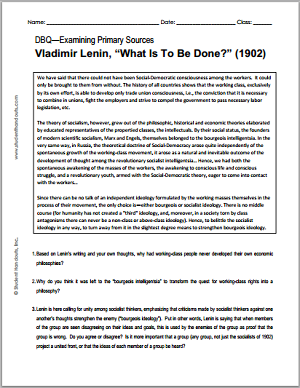"We have said that there could not have been Social-Democratic consciousness among the workers. It could only be brought to them from without. The history of all countries shows that the working class, exclusively by its own effort, is able to develop only trade union consciousness, i.e., the conviction that it is necessary to combine in unions, fight the employers and strive to compel the government to pass necessary labor legislation, etc.
 "The theory of socialism, however, grew out of the philosophic, historical and economic theories elaborated by educated representatives of the propertied classes, the intellectuals. By their social status, the founders of modern scientific socialism, Marx and Engels, themselves belonged to the bourgeois intelligentsia. In the very same way, in Russia, the theoretical doctrine of Social-Democracy arose quite independently of the spontaneous growth of the working-class movement, it arose as a natural and inevitable outcome of the development of thought among the revolutionary socialist intelligentsia… Hence, we had both the spontaneous awakening of the masses of the workers, the awakening to conscious life and conscious struggle, and a revolutionary youth, armed with the Social-Democratic theory, eager to come into contact with the workers…
"The theory of socialism, however, grew out of the philosophic, historical and economic theories elaborated by educated representatives of the propertied classes, the intellectuals. By their social status, the founders of modern scientific socialism, Marx and Engels, themselves belonged to the bourgeois intelligentsia. In the very same way, in Russia, the theoretical doctrine of Social-Democracy arose quite independently of the spontaneous growth of the working-class movement, it arose as a natural and inevitable outcome of the development of thought among the revolutionary socialist intelligentsia… Hence, we had both the spontaneous awakening of the masses of the workers, the awakening to conscious life and conscious struggle, and a revolutionary youth, armed with the Social-Democratic theory, eager to come into contact with the workers…
"Since there can be no talk of an independent ideology formulated by the working masses themselves in the process of their movement, the only choice is—either bourgeois or socialist ideology. There is no middle course (for humanity has not created a 'third' ideology, and, moreover, in a society torn by class antagonisms there can never be a non-class or above-class ideology). Hence, to belittle the socialist ideology in any way, to turn away from it in the slightest degree means to strengthen bourgeois ideology."
Questions: 1. Based on Lenin's writing and your own thoughts, why had working-class people never developed their own economic philosophies? 2. Why do you think it was left to the "bourgeois intelligentsia" to transform the quest for working-class rights into a philosophy? 3. Lenin is here calling for unity among socialist thinkers, emphasizing that criticisms made by socialist thinkers against one another's thoughts strengthen the enemy ("bourgeois ideology"). Put in other words, Lenin is saying that when members of the group are seen disagreeing on their ideas and goals, this is used by the enemies of the group as proof that the group is wrong. Do you agree or disagree? Is it more important that a group (any group, not just the socialists of 1902) project a united front, or that the ideas of each member of a group be heard?
|
 "The theory of socialism, however, grew out of the philosophic, historical and economic theories elaborated by educated representatives of the propertied classes, the intellectuals. By their social status, the founders of modern scientific socialism, Marx and Engels, themselves belonged to the bourgeois intelligentsia. In the very same way, in Russia, the theoretical doctrine of Social-Democracy arose quite independently of the spontaneous growth of the working-class movement, it arose as a natural and inevitable outcome of the development of thought among the revolutionary socialist intelligentsia… Hence, we had both the spontaneous awakening of the masses of the workers, the awakening to conscious life and conscious struggle, and a revolutionary youth, armed with the Social-Democratic theory, eager to come into contact with the workers…
"The theory of socialism, however, grew out of the philosophic, historical and economic theories elaborated by educated representatives of the propertied classes, the intellectuals. By their social status, the founders of modern scientific socialism, Marx and Engels, themselves belonged to the bourgeois intelligentsia. In the very same way, in Russia, the theoretical doctrine of Social-Democracy arose quite independently of the spontaneous growth of the working-class movement, it arose as a natural and inevitable outcome of the development of thought among the revolutionary socialist intelligentsia… Hence, we had both the spontaneous awakening of the masses of the workers, the awakening to conscious life and conscious struggle, and a revolutionary youth, armed with the Social-Democratic theory, eager to come into contact with the workers…












